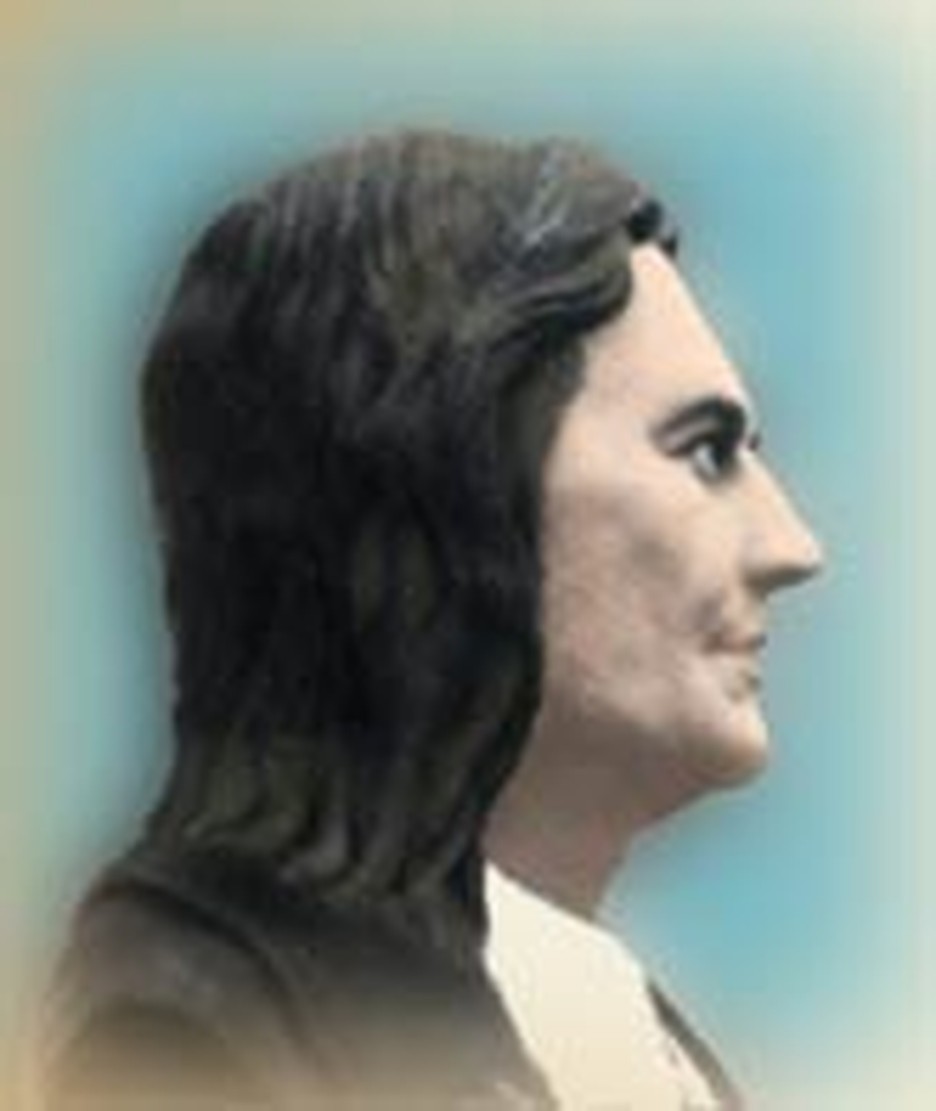
It was the kind of experience that tests the limits of human endurance. A solitary figure slogged through snow drifts in a wild, uninhabited landscape. His face was pinched with cold and hunger. 1636 was one of the coldest winters the colonists in Massachusetts could remember, and the man, Roger Williams, would be out in it for fourteen weeks.
Roger Williams receiving land grant from Narragansett Indians. His cordial relationships with native Americans prompted Massachusetts authorities eventually to ask Williams to negotiate with tribes during a war with the Pequot Indians. Williams was so helpful that Massachusetts actually considered revoking his banishment.
When I was unkindly and unchristianly... driven from my house and land and wife and children (in the midst of a New England winter, now about thirty-five years past) at Salem, that ever-honored Governor, Mr. Winthrop, privately wrote me to steer my course to Narragansett Bay...I took his prudent notion as a hint and voice from God, and waiving all other thoughts and motions, I steered my course from Salem (though in winter snow, which I feel yet) unto these parts, wherein...I have seen the face of God.
Roger was on the run. Someone -- perhaps his old friend Governor John Winthrop -- had tipped him off that Massachusetts agents were on their way to seize him and send him back to England.
If he appeared in England, Roger would have to face the wrath of Archbishop William Laud, a notorious persecutor of Separatists (Puritans who wanted to separate from the Church of England). Rather than run that risk, Roger preferred to brave the elements alone in the frozen wilderness.
Banished for Balking Puritan Beliefs
Why did Massachusetts authorities have it in for Roger Williams? The short answer is that they considered him a dangerous nuisance -- even a crank. He disagreed with some of their theology and constantly found fault with what they did.
For instance, he said that the king of England had no right to give away land that belonged to Native Americans. This was land on which whites had already settled without payment. He also insisted that governments have no right to force people to hold a certain set of religious beliefs, a practice he compared to rape.
Religious Unity = Civil Unity
Like most groups of that day, Puritans believed that religious unity was necessary if a nation was not to tear itself apart. God being sovereign over all, it was the duty of a government to require that people worship and obey Him according to a nation's chosen set of rules. But Roger rejected this reasoning. He demanded instead that there be no state compulsion in religion.
A Doctrine That Shed Much Blood
In his most important writing, The Bloody Tenet of Persecution, Roger Williams argued at great length against doctrines that permitted religious persecution.
A Place to Test His Theories
He soon had the opportunity to test his theories. Surviving the winter, thanks to help from Narragansett Indians, he was joined by friends. They founded a town which Williams named "Providence" because of the way God had provided for him in his exile. He was also founder of the state of Rhode Island and founded the first Baptist church in America.
Practicing his own principles, Roger purchased land from Native Americans. However, to guard the settlers' interests, he also obtained a charter from Great Britain. Rhode Island's charter was the first document in the history of the American people to guarantee religious freedom to all of the inhabitants of a political unit. Jews and Quakers, persecuted throughout Europe, quickly began to make their way to Rhode Island, where they could enjoy what Roger called "soul liberty."
Not Abandoned by God, Even in the Wilderness
Roger Williams found that God was always present, even during that brutally cold 1636 winter.
Landmarks in Williams' LifeGod makes a Path, provides a Guide
And feeds in Wilderness!
His glorious Name while breath remains
O that I may confess.Lost many a time, I have had no Guide,
No House but Hollow Tree!
In stormy Winter Night no Fire,
No Food, no Company:In him I have found a House, a Bed,
A Table, Company:
No Cup so bitter, but's made sweet,
When God shall Sweet'ning be.
c. 1603 born in London, England
1627 Takes BA at Cambridge
1629 Ordained in Church of England
1629 Marries Mary Barnard
1630 Sails to New England
1633 Questions the King's right to give away Native American lands
1635 Banished by Massachusetts (with six week's grace) for dangerous opinions
1636 Flees from Salem in midwinter
1636 Founds Providence with land acquired from Native Americans
1637 Negotiates with warring Indians on behalf of Massachusetts
1639 Becomes a Baptist temporarily
1643 Goes to England for a charter
1643 Publishes Key into the Language of America and other works
1644 Obtains 1st Rhode Island charter
1644 Publishes The Bloody Tenent of Persecution; returns to Providence
1651-54 Returns to England to rescue Rhode Island's charter
1654 Becomes leader of Rhode Island
1672 Debates Quakers
1675 Reduced to poverty by war
1683 Dies neglected, belonging to no church
Remembering Roger's Revolutionary Role
We tend to take freedom of religion for granted: that we can worship according to our personal convictions and individual conscience. It's easy to assume that it has always been that way. It hasn't! Just the opposite. Throughout the ages and around the world in human history, religion and politics have been intertwined.
It was the sixteenth century Anabaptists in Switzerland who first raised strenuous objections and called for religion to be independent from civil authorities. But they were too radical for their time and were effectively put down.
It was Roger Williams in Rhode Island who was the first to establish effectively an official government policy and implemented a law that religion was to be free and up to the individual with no civic interference.
New England Preachers Warred with Words
John Cotton argued that states should enforce religious beliefs and practices for God's glory.
"It is true, Christ hath appointed spiritual means for the avoiding and preventing the infection of heresies. . .but that hindereth not the lawful and necessary use of a civil sword for the punishment of some such offenses as are subject to church censure. . . .
"As: 1. That when the church hath cast out an heretic, yet he still remaineth obstinate and proceedeth to seduce and destroy the faith of some (it may be many). . . . If the magistrate's sword do here rust in the scabbard, such leaven may leaven the whole mass of city or country. . ."
States have no right to dictate beliefs said Roger Williams, advocating separation of the two.
"True it is, the sword [persecution] may make a whole nation of hypocrites. But to recover a soul from Satan by repentance. . .that only works the all-powerful God by the sword of the Spirit [God's word] in the hand of his spiritual officers.
". . . the civil state is bound before God to take off that bond and yoke of soul oppression and to proclaim free and impartial liberty to all the people...to choose and maintain what worship and ministry their souls and consciences are persuaded of. . . ."
Resources:
- Covey, Cyclone. The Gentle Radical. New York: Macmillan, 1966.
- Gaustad, Edwin S. Liberty of Conscience; Roger Williams in America. (Library of Religious Biography) Grand Rapids, MI: Eerdmans, 1991.
- Kunitz, Stanley. American authors, 1600-1900: a biographical dictionary of American literature. New York: The H. W. Wilson company, 1938.
- Miller, Perry. Roger Williams, His Contribution to the American Tradition. New York: Atheneum, 1962.
- Morgan, Edmund Sears. Roger Williams; the church and the state. New York: Harcourt, Brace & World, 1967.
- Roger Williams: Freedom’s Forgotten Hero [Videorecording] Freedom Research Productions Fair Oaks, CA
- Rutman, Darrett B. "Williams, Roger." Encyclopedia of American Biography. Edited by John A. Garraty. New York: Harper and Row, 1974.
- Williams, Roger. The Bloody Tenent of Persecution. Various internet editions.
- "Williams, Roger." Dictionary of American Biography. New York: Scribner, 1958 - 1964.
- "Williams, Roger." The Oxford Dictionary of the Christian Church. Edited by F. L. Cross and E. A. Livingstone. Oxford, 1997.
- Winslow, Ola Elizabeth. Master Roger Williams, a biography. New York: Macmillan, 1957.
- Various encyclopedia and internet articles.
- Wood, James E. editor. Baptists and the American Experience. Judson Press, Valley Forge, PA.







